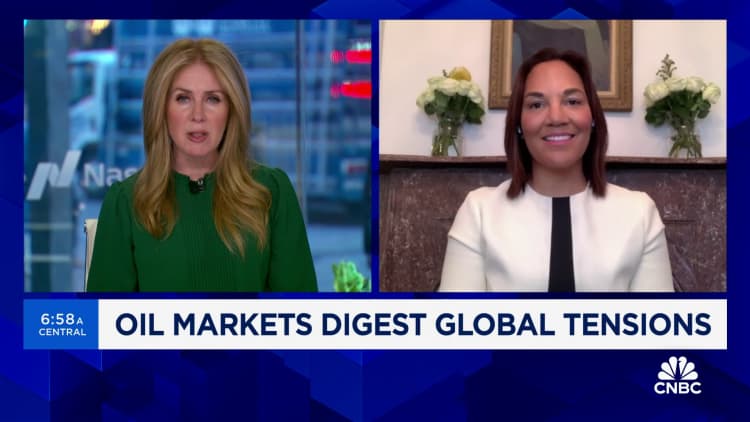- U.S. crude oil is trading at its lowest level since March.
- The House of Representatives passed legislation over the weekend that would broaden sanctions against Iran’s oil exports
- The Senate is expected to consider the bill this week. President Joe Biden would have the authority to waive the penalties.
U.S. crude oil fell below $81 a barrel on Tuesday, the lowest level since March, as the market brushed off the threat of additional sanctions on Iranian oil.
West Texas Intermediate is now trading below its 50-day moving average of $81.22 a barrel for the first time since February. U.S. oil prices have fallen more than $6 from this year’s high of $87.62 when traders bid up prices on fears of war between Iran and Israel.
Those fears have largely dissipated as Iran and Israel have signaled they are not interested in a wider war after trading tit-for-tat strikes earlier this month.
Here are the latest energy prices:
- West Texas Intermediate June contract: $80.92 a barrel, down 97 cents or 1.18%. U.S. crude oil is up about 13% this year.
- Brent June contract: $86.09 a barrel, down 91 cents or 1.05%. The global benchmark is up about 12% this year.
- RBOB Gasoline May contract: $2.65 a gallon, down 3 cents or 1.33%. Gasoline futures are up about 26% this year.
- Natural Gas May contract: $1.76, down 1.62%. Natural gas is down 30% this year.
The House of Representatives passed legislation over the weekend that would broaden sanctions against Iran’s oil exports to include foreign ports, vessels and refineries that knowingly process crude from the Islamic Republic. The Senate could vote on the bill as soon as this week.

Under terms of the bill, President Biden would implement sanctions within 180 days of the legislation’s passage, but has the authority to waive penalties if he determines it is in the national security interests of the U.S.
“This bill significantly increases sanctions on Iran, it increases the enforcement mechanisms,” Helima Croft, commodities strategist with RBC Capital Markets, told CNBC’s Squawk Box on Monday.
The White House will face a “tough choice” this summer on whether to impose the sanctions or issue waivers due to concerns about a tight oil market, Croft said.
The Biden administration is very concerned about high oil prices ahead of the election, said Amrita Sen, founder and director of research at Energy Aspects.
“It’s a U.S. election year, and the U.S. is going to do absolutely anything in its power to make sure prices don’t go up,” Sen told CNBC’s “Crude Realities” on Tuesday.











